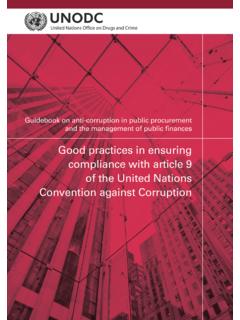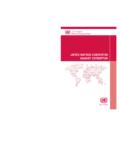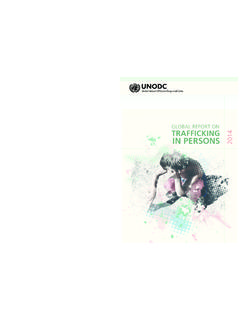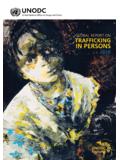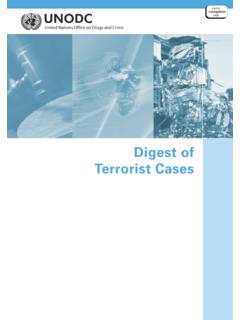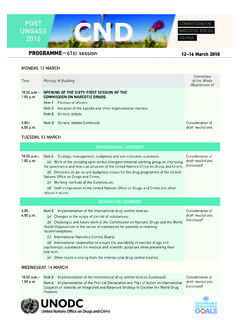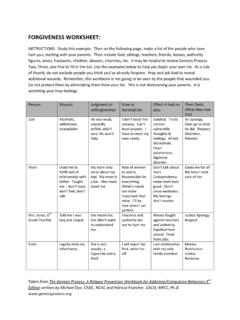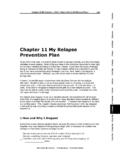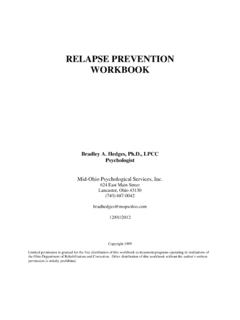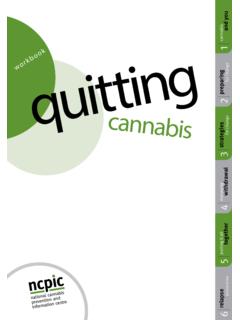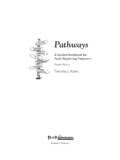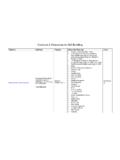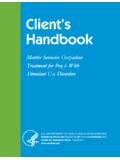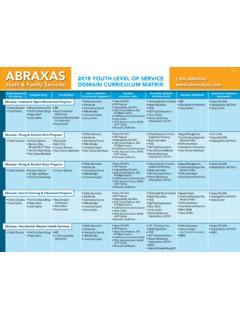Transcription of Cognitive Behavioural & Relapse Prevention Strategies
1 1 LeaderLeader s Guides GuideCognitive Cognitive BehaviouralBehavioural& Relapse & Relapse Prevention StrategiesPrevention StrategiesTreatnet Training Volume B, Module 3: Updated 18 September 20072 Training goalsTraining knowledge of Cognitive Behavioural Increase knowledge of Cognitive Behavioural therapy (CBT) and Relapse Prevention (RP) therapy (CBT) and Relapse Prevention (RP) Strategies and and skills using CBT and RP Strategies Increase skills using CBT and RP Strategies and application of CBT and RP Strategies Increase application of CBT and RP Strategies for substance abuse treatmentfor substance abuse treatment3 Module 3: WorkshopsModule 3.
2 WorkshopsWorkshop 1:Workshop 1:Basic Concepts of CBT and RPBasic Concepts of CBT and RPWorkshop 2:Workshop 2: Cognitive Behavioural Cognitive Behavioural StrategiesStrategiesWorkshop 3:Workshop 3:Methods for Using Cognitive Methods for Using Cognitive Behavioural StrategiesBehavioural Strategies4 Workshop 1:Workshop 1:Basic ConceptsBasic Conceptsof CBT and RPof CBT and RP5 PrePre--assessmentassessmentPlease respond to the prePlease respond to the pre--assessment assessment questions in your in your workbook.
3 (Your responses are strictly confidential.)(Your responses are strictly confidential.)10 you had to move to an uninhabited island, If you had to move to an uninhabited island, what 3 things would you take with you and what 3 things would you take with you and why? (food and water are provided)why? (food and water are provided)7 Training objectives Training objectives At the end of this workshop, you will:At the end of this workshop, you that substance use is a learned behaviour that Understand that substance use is a learned behaviour that can be modified according to principles of conditioning and can be modified according to principles of conditioning and key principles of classical and operant Understand key principles of classical and operant conditioning and modellingconditioning and how these principles apply to the treatments Understand how these principles apply to the treatments delivered in Cognitive Behavioural
4 Therapy and Relapse delivered in Cognitive Behavioural therapy and Relapse Prevention training Prevention training the basic approaches used in Cognitive Understand the basic approaches used in Cognitive Behavioural therapy and how they apply to reducing drug Behavioural therapy and how they apply to reducing drug use and preventing relapseuse and preventing how to conduct a functional analysis and know Understand how to conduct a functional analysis and know about the 5 Ws of a clientabout the 5 Ws of a client s drug uses drug use8 What are Cognitive What are Cognitive BehaviouralBehaviouralTherapy (CBT) Therapy (CBT) and Relapse Prevention and Relapse Prevention (RP)?
5 (RP)?9 What is CBT and how is it used in What is CBT and how is it used in addiction treatment?addiction treatment? CBT is a form of CBT is a form of talk therapytalk therapy that is used to that is used to teach, encourage, and support individuals teach, encourage, and support individuals about how to reduce / stop their harmful drug about how to reduce / stop their harmful drug CBT provides skills that are valuable in CBT provides skills that are valuable in assisting people in gaining initial abstinence assisting people in gaining initial abstinence from drugs (or in reducing their drug use).
6 From drugs (or in reducing their drug use). CBT also provides skills to help people sustain CBT also provides skills to help people sustain abstinence ( Relapse Prevention )abstinence ( Relapse Prevention )10 What is Relapse Prevention (RP)?What is Relapse Prevention (RP)?Broadly conceived, RP is a cognitiveBroadly conceived, RP is a Cognitive -- Behavioural Behavioural treatment (CBT) with a focus on the maintenance treatment (CBT) with a focus on the maintenance stage of addictive behaviour change that has two stage of addictive behaviour change that has two main goals: main goals.
7 To prevent the occurrence of initial lapses after To prevent the occurrence of initial lapses after a commitment to change has been made anda commitment to change has been made and To prevent any lapse that does occur fromTo prevent any lapse that does occur fromescalating into a fullescalating into a full--blow relapseblow relapseBecause of the common elements of RP and CBT, we Because of the common elements of RP and CBT, we will refer to all of the material in this training module will refer to all of the material in this training module as CBTas CBT11 Foundation of CBT: Foundation of CBT.
8 Social Learning Theory Social Learning Theory Cognitive Behavioural therapy (CBT) Cognitive Behavioural therapy (CBT) Provides critical concepts of addiction and how Provides critical concepts of addiction and how to not use drugsto not use drugs Emphasises the development of new skillsEmphasises the development of new skills Involves the mastery of skills through practiseInvolves the mastery of skills through practise12 Why is CBT useful? (1)Why is CBT useful? (1) CBT is a counselingCBT is a counseling--teaching approach teaching approach wellwell--suited to the resource capabilities of suited to the resource capabilities of most clinical programs most clinical programs CBT has been extensively evaluated in CBT has been extensively evaluated in rigorous clinical trials and has solid rigorous clinical trials and has solid empirical supportempirical support CBT is structured, goalCBT is structured, goal--oriented, and oriented.
9 And focused on the immediate problems faced focused on the immediate problems faced by substance abusers entering treatment by substance abusers entering treatment who are struggling to control their use who are struggling to control their use 13 Why is CBT useful? (2)Why is CBT useful? (2) CBT is a flexible, individualized approach that CBT is a flexible, individualized approach that can be adapted to a wide range of clients as can be adapted to a wide range of clients as well as a variety of settings (inpatient, well as a variety of settings (inpatient, outpatient) and formats (group, individual)outpatient) and formats (group, individual)
10 CBT is compatible with a range of other CBT is compatible with a range of other treatments the client may receive, such as treatments the client may receive, such as pharmacotherapypharmacotherapy14 Important concepts in CBT (1)Important concepts in CBT (1)In the early stages of CBT treatment, Strategies In the early stages of CBT treatment, Strategies stress Behavioural change. Strategies include:stress Behavioural change. Strategies include: planning time to engage in nonplanning time to engage in non--drug related drug related behaviourbehaviour avoiding or leaving a drugavoiding or leaving a drug--use concepts in CBT (2)Important concepts in CBT (2)CBT attempts to help clients:CBT attempts to help clients.
